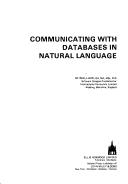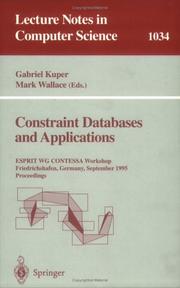| Listing 1 - 10 of 34 | << page >> |
Sort by
|

ISBN: 0853126399 0470201053 Year: 1984 Volume: vol *20 Publisher: Chichester New York Brisbane Horwood Wiley
Abstract | Keywords | Export | Availability | Bookmark
 Loading...
Loading...Choose an application
- Reference Manager
- EndNote
- RefWorks (Direct export to RefWorks)
Artificial intelligence. Robotics. Simulation. Graphics --- Information systems --- Interactive computer systems --- Prolog (Computer program language) --- Computational linguistics --- Systèmes conversationnels (Informatique) --- PROLOG (Langage de programmation) --- Linguistique informatique --- 681.3*H2 --- Natural language processing (Computer science) --- 681.3*I21 --- NLP (Computer science) --- Artificial intelligence --- Electronic data processing --- Human-computer interaction --- Semantic computing --- Computer systems --- Online data processing --- Database management: security; integrity; protection--See also {?681.5*E5} --- Applications and expert systems (Artificial intelligence). Cartography. Games. Industrial automation. Law. Medicine and science. Natural language interfaces. Office automation--See also {681.3*H4}; {681.3*J} --- 681.3*I21 Applications and expert systems (Artificial intelligence). Cartography. Games. Industrial automation. Law. Medicine and science. Natural language interfaces. Office automation--See also {681.3*H4}; {681.3*J} --- 681.3*H2 Database management: security; integrity; protection--See also {?681.5*E5} --- Systèmes conversationnels (Informatique) --- Prolog [Langage de programmation]. --- Prolog [Programmatietaal].
Book
ISBN: 3030417328 303041731X Year: 2020 Publisher: Cham : Springer International Publishing : Imprint: Springer,
Abstract | Keywords | Export | Availability | Bookmark
 Loading...
Loading...Choose an application
- Reference Manager
- EndNote
- RefWorks (Direct export to RefWorks)
This book introduces readers to the principles of intelligent decision support systems (IDSS) and how to build them with MiniZinc, a free, open-source constraint programming language. Managing an IDSS project requires an understanding of the system’s design and behaviour. The book enables readers to appreciate what “combinatorial” optimisation problems are, and how modelling a problem provides the basis for solving it. It also presents the main algorithms for tackling decision support problems, discusses their strengths and weaknesses, and explores ways of achieving the necessary scalability when problems become big. Moreover, to support the learning process it allows readers to try out the ideas described in the text on model applications and puzzles. The book highlights the potential benefits of deploying an IDSS. It enables users to recognise the key risks involved and identify which techniques can be applied to minimise them, and to understand the decision support technology sufficiently in order to manage or monitor an IDSS project. It also helps readers distinguish between good sense and mere jargon when dealing with anyone involved in an IDSS project, from sales personnel to software implementers. As such it especially appeals to graduate students and advanced professionals who need to learn how to build an IDSS and to tackle the problems on the way.
Decision support systems. --- Management information systems --- Telematics --- Application software. --- Operations research. --- Decision making. --- Computer science—Mathematics. --- Computer programming. --- Computer Appl. in Administrative Data Processing. --- Operations Research/Decision Theory. --- Discrete Mathematics in Computer Science. --- Programming Techniques. --- Deciding --- Decision (Psychology) --- Decision analysis --- Decision processes --- Making decisions --- Management --- Management decisions --- Choice (Psychology) --- Problem solving --- Operational analysis --- Operational research --- Industrial engineering --- Management science --- Research --- System theory --- Application computer programs --- Application computer software --- Applications software --- Apps (Computer software) --- Computer software --- Computers --- Electronic computer programming --- Electronic data processing --- Electronic digital computers --- Programming (Electronic computers) --- Coding theory --- Decision making --- Programming
Multi
ISBN: 9783030417321 3030417328 Year: 2020 Publisher: Cham : Springer International Publishing : Imprint: Springer,
Abstract | Keywords | Export | Availability | Bookmark
 Loading...
Loading...Choose an application
- Reference Manager
- EndNote
- RefWorks (Direct export to RefWorks)
This book introduces readers to the principles of intelligent decision support systems (IDSS) and how to build them with MiniZinc, a free, open-source constraint programming language. Managing an IDSS project requires an understanding of the system’s design and behaviour. The book enables readers to appreciate what “combinatorial” optimisation problems are, and how modelling a problem provides the basis for solving it. It also presents the main algorithms for tackling decision support problems, discusses their strengths and weaknesses, and explores ways of achieving the necessary scalability when problems become big. Moreover, to support the learning process it allows readers to try out the ideas described in the text on model applications and puzzles. The book highlights the potential benefits of deploying an IDSS. It enables users to recognise the key risks involved and identify which techniques can be applied to minimise them, and to understand the decision support technology sufficiently in order to manage or monitor an IDSS project. It also helps readers distinguish between good sense and mere jargon when dealing with anyone involved in an IDSS project, from sales personnel to software implementers. As such it especially appeals to graduate students and advanced professionals who need to learn how to build an IDSS and to tackle the problems on the way.
Operational research. Game theory --- Mathematical statistics --- Mathematics --- Planning (firm) --- Programming --- Computer architecture. Operating systems --- Computer. Automation --- applicatiebeheer --- apps --- besluitvorming --- computers --- informatica --- mathematische modellen --- externe fixatie (geneeskunde --- econometrie --- operationeel onderzoek --- architectuur (informatica) --- Application software. --- Operations research. --- Decision making. --- Computer science—Mathematics. --- Computer programming. --- Computer Appl. in Administrative Data Processing. --- Operations Research/Decision Theory. --- Discrete Mathematics in Computer Science. --- Programming Techniques.
Book
Year: 1973 Publisher: Pittsburgh, Pa Carnegie-Mellon University
Abstract | Keywords | Export | Availability | Bookmark
 Loading...
Loading...Choose an application
- Reference Manager
- EndNote
- RefWorks (Direct export to RefWorks)

ISBN: 1890311014 Year: 1997 Publisher: Washington, DC : Edge Books,
Abstract | Keywords | Export | Availability | Bookmark
 Loading...
Loading...Choose an application
- Reference Manager
- EndNote
- RefWorks (Direct export to RefWorks)

ISBN: 0817310967 0817310975 Year: 2002 Publisher: University (Ala.) : University of Alabama press,
Abstract | Keywords | Export | Availability | Bookmark
 Loading...
Loading...Choose an application
- Reference Manager
- EndNote
- RefWorks (Direct export to RefWorks)
Poetry --- American literature --- anno 1990-1999 --- American poetry --- Avant-garde (Aesthetics) --- Experimental poetry, American --- Poetics --- History and criticism. --- History --- History and criticism --- AMERICAN POETRY --- EXPERIMENTAL POETRY --- POETICS --- AVANT-GARDE (LITTERATURE) --- 20th CENTURY --- U.S. --- ETATS-UNIS

ISBN: 3540607943 3540494561 9783540607946 Year: 1996 Volume: 1034 Publisher: Berlin: Springer,
Abstract | Keywords | Export | Availability | Bookmark
 Loading...
Loading...Choose an application
- Reference Manager
- EndNote
- RefWorks (Direct export to RefWorks)
This book constitutes the refereed proceedings of the ESPRIT Working Group CONTESSA Workshop on Constraint Databases and Applications, held in Friedrichshafen, Germany in September 1995. The 10 full revised papers selected for inclusion in this volume are written by and for practitioners, researchers, and application users of core constraint database technology; they can be classified in three sections on expressiveness of the various constraint database models; implementation and optimization issues in areas like spatial databases, geographic information systems, scheduling and routing. This book is the first to focus on the extension of the important new programming paradigm of constraint processing to database design and management.
Constraint databases --- Database management --- Congresses. --- Constraint programming (Computer science) --- Programmation par contraintes --- Bases de données --- Congrès --- Gestion --- Congresses --- Data structures (Computer scienc. --- Geographical information systems. --- Information storage and retrieval systems. --- Database management. --- Computer science. --- Data Structures and Information Theory. --- Geographical Information Systems/Cartography. --- Information Storage and Retrieval. --- Database Management. --- Programming Techniques. --- Programming Languages, Compilers, Interpreters. --- Informatics --- Science --- Data base management --- Data services (Database management) --- Database management services --- DBMS (Computer science) --- Generalized data management systems --- Services, Database management --- Systems, Database management --- Systems, Generalized database management --- Electronic data processing --- Automatic data storage --- Automatic information retrieval --- Automation in documentation --- Computer-based information systems --- Data processing systems --- Data storage and retrieval systems --- Discovery systems, Information --- Information discovery systems --- Information processing systems --- Information retrieval systems --- Machine data storage and retrieval --- Mechanized information storage and retrieval systems --- Computer systems --- Electronic information resources --- Data libraries --- Digital libraries --- Information organization --- Information retrieval --- Geographical information systems --- GIS (Information systems) --- Information storage and retrieval systems --- Geography --- Constraint databases - Congresses. --- Database management - Congresses
Book
ISBN: 9780800664619 0800664612 Year: 2010 Publisher: Minneapolis (Minn.): Fortress Press,
Abstract | Keywords | Export | Availability | Bookmark
 Loading...
Loading...Choose an application
- Reference Manager
- EndNote
- RefWorks (Direct export to RefWorks)
Ecotheology --- Human ecology --- Nature
Book
ISBN: 9780823281343 Year: 2018 Publisher: New York, NY
Abstract | Keywords | Export | Availability | Bookmark
 Loading...
Loading...Choose an application
- Reference Manager
- EndNote
- RefWorks (Direct export to RefWorks)
Multi
ISBN: 9780823281343 9780823281329 Year: 2018 Publisher: New York, N.Y. Fordham University Press
Abstract | Keywords | Export | Availability | Bookmark
 Loading...
Loading...Choose an application
- Reference Manager
- EndNote
- RefWorks (Direct export to RefWorks)
| Listing 1 - 10 of 34 | << page >> |
Sort by
|

 Search
Search Feedback
Feedback About UniCat
About UniCat  Help
Help News
News